Analyzing Leadership and Responsibility in the Hospitality Sector
VerifiedAdded on 2024/05/30
|14
|3452
|447
Essay
AI Summary
This essay provides a comprehensive analysis of various leadership styles applicable in the hospitality industry, including transformational, transactional, democratic, and situational leadership. It uses examples like Chip Conley, Cesar Ritz, Angela Brav, and Jim Sullivan to illustrate these styles. The essay also explores essential leadership traits such as accountability, motivation, strategic thinking, confidence, problem-solving, and ambition, discussing their impact on leadership effectiveness. Furthermore, it examines the management process within the hospitality sector, covering planning, organizing, coordinating, staffing, leading, controlling, and evaluating, using the Royal Hotel as a case study. Finally, the essay delves into organizational responsibility and responsible leadership, emphasizing their role in fostering corporate social responsibility within the hospitality industry, highlighting the importance of ethical practices and stakeholder engagement.
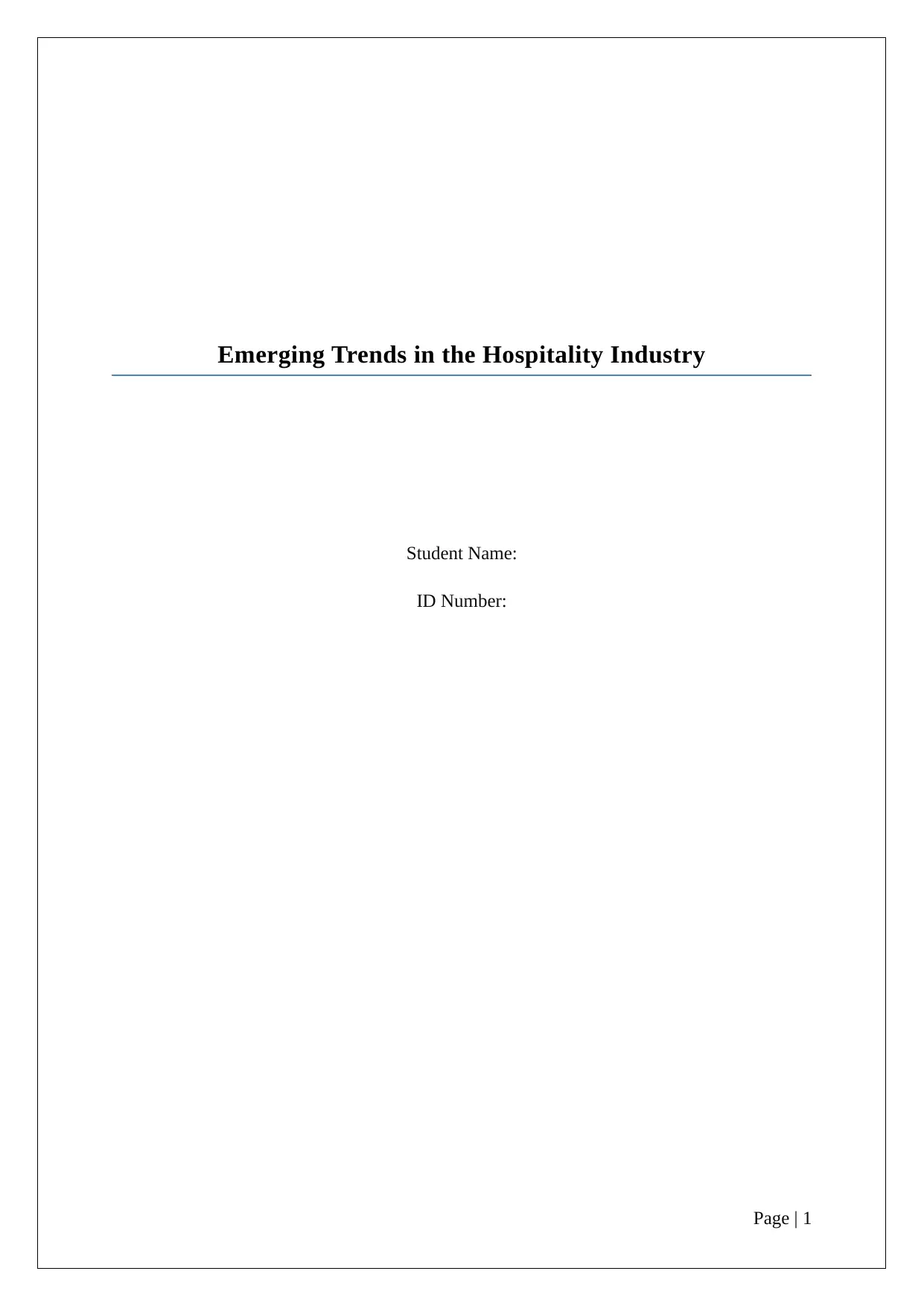
Emerging Trends in the Hospitality Industry
Student Name:
ID Number:
Page | 1
Student Name:
ID Number:
Page | 1
Paraphrase This Document
Need a fresh take? Get an instant paraphrase of this document with our AI Paraphraser

Table of Contents
Introduction................................................................................................................................3
Assessment Questions................................................................................................................4
Summary and Conclusion........................................................................................................12
Reference List..........................................................................................................................13
Page | 2
Introduction................................................................................................................................3
Assessment Questions................................................................................................................4
Summary and Conclusion........................................................................................................12
Reference List..........................................................................................................................13
Page | 2
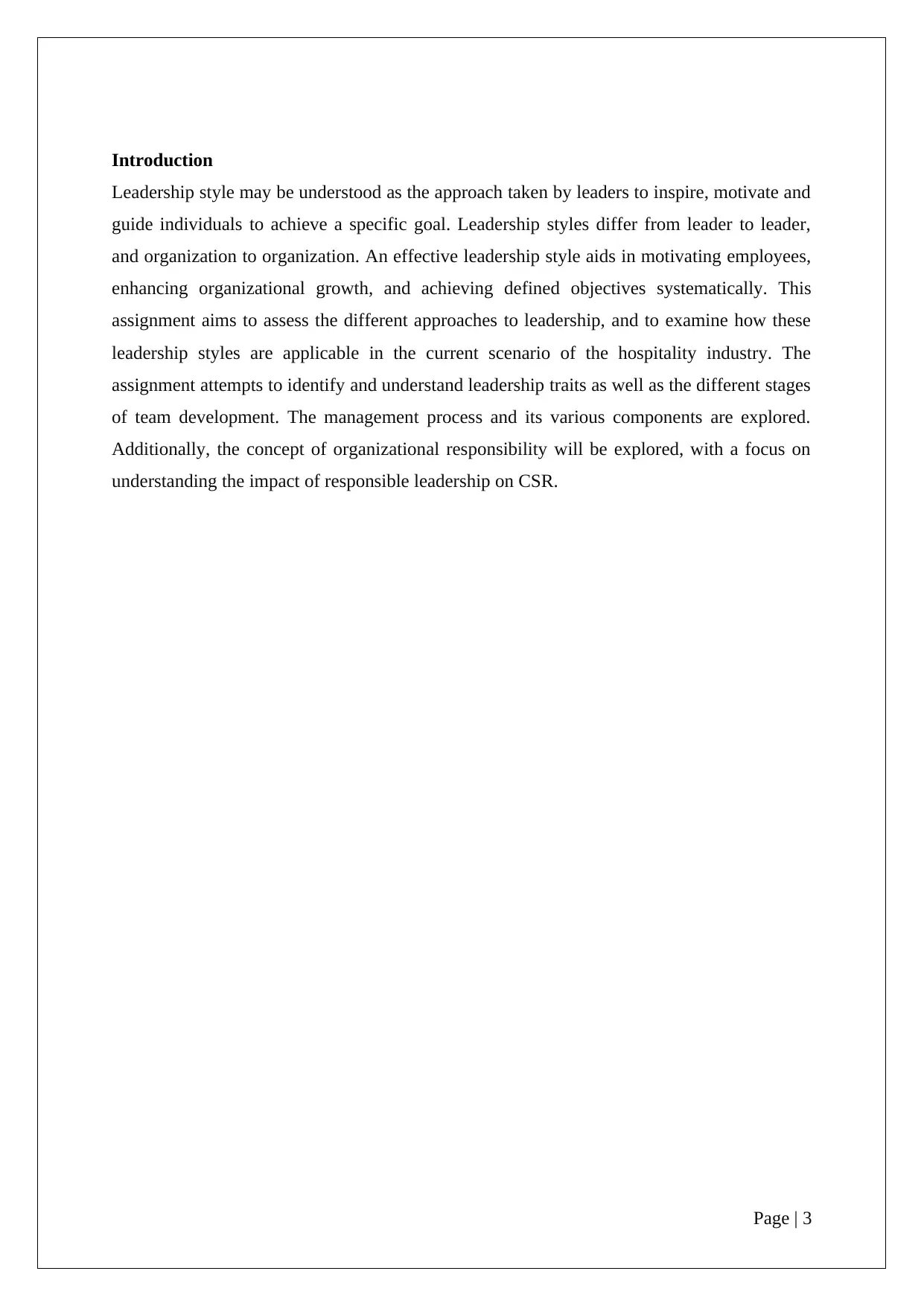
Introduction
Leadership style may be understood as the approach taken by leaders to inspire, motivate and
guide individuals to achieve a specific goal. Leadership styles differ from leader to leader,
and organization to organization. An effective leadership style aids in motivating employees,
enhancing organizational growth, and achieving defined objectives systematically. This
assignment aims to assess the different approaches to leadership, and to examine how these
leadership styles are applicable in the current scenario of the hospitality industry. The
assignment attempts to identify and understand leadership traits as well as the different stages
of team development. The management process and its various components are explored.
Additionally, the concept of organizational responsibility will be explored, with a focus on
understanding the impact of responsible leadership on CSR.
Page | 3
Leadership style may be understood as the approach taken by leaders to inspire, motivate and
guide individuals to achieve a specific goal. Leadership styles differ from leader to leader,
and organization to organization. An effective leadership style aids in motivating employees,
enhancing organizational growth, and achieving defined objectives systematically. This
assignment aims to assess the different approaches to leadership, and to examine how these
leadership styles are applicable in the current scenario of the hospitality industry. The
assignment attempts to identify and understand leadership traits as well as the different stages
of team development. The management process and its various components are explored.
Additionally, the concept of organizational responsibility will be explored, with a focus on
understanding the impact of responsible leadership on CSR.
Page | 3
⊘ This is a preview!⊘
Do you want full access?
Subscribe today to unlock all pages.

Trusted by 1+ million students worldwide
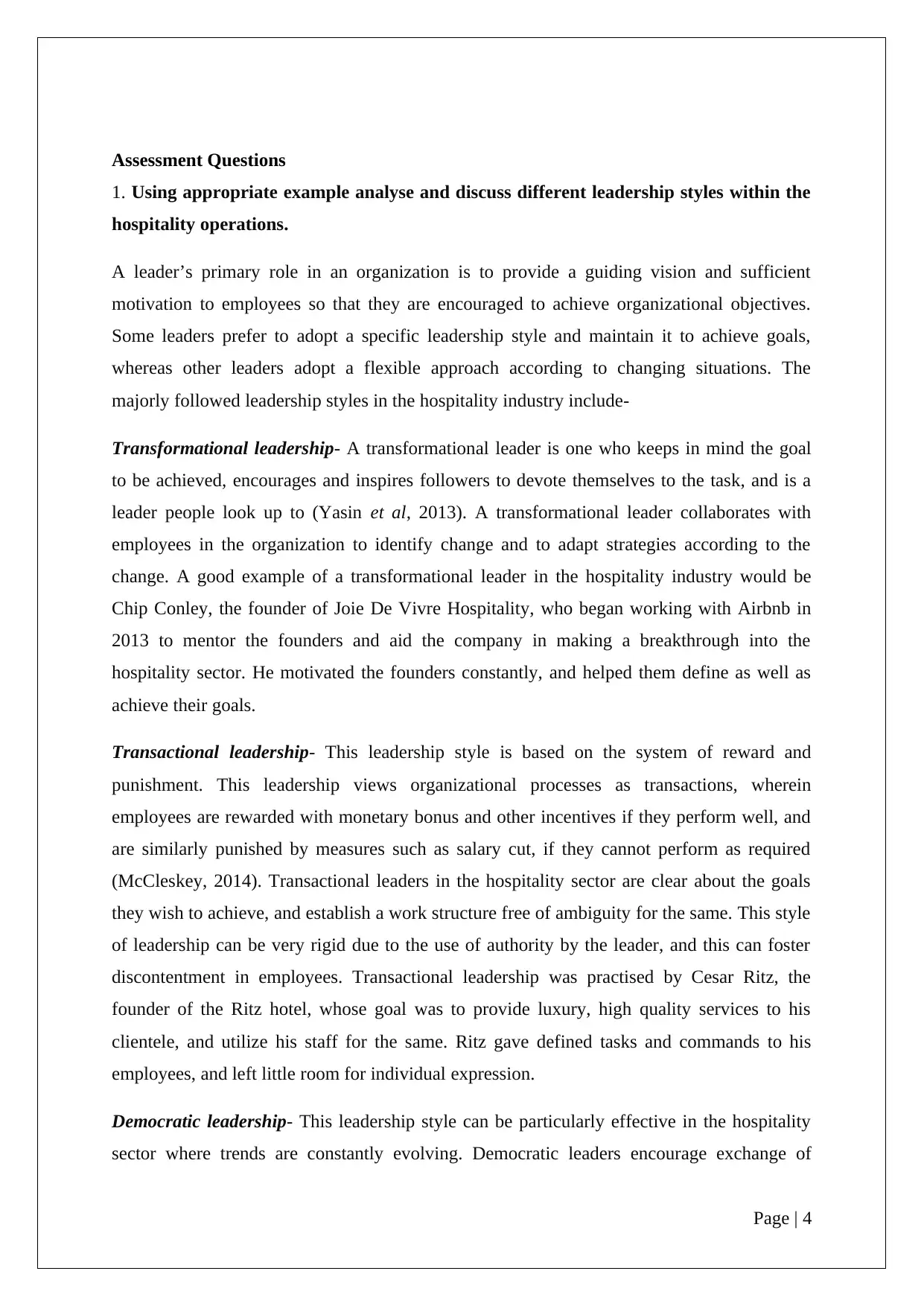
Assessment Questions
1. Using appropriate example analyse and discuss different leadership styles within the
hospitality operations.
A leader’s primary role in an organization is to provide a guiding vision and sufficient
motivation to employees so that they are encouraged to achieve organizational objectives.
Some leaders prefer to adopt a specific leadership style and maintain it to achieve goals,
whereas other leaders adopt a flexible approach according to changing situations. The
majorly followed leadership styles in the hospitality industry include-
Transformational leadership- A transformational leader is one who keeps in mind the goal
to be achieved, encourages and inspires followers to devote themselves to the task, and is a
leader people look up to (Yasin et al, 2013). A transformational leader collaborates with
employees in the organization to identify change and to adapt strategies according to the
change. A good example of a transformational leader in the hospitality industry would be
Chip Conley, the founder of Joie De Vivre Hospitality, who began working with Airbnb in
2013 to mentor the founders and aid the company in making a breakthrough into the
hospitality sector. He motivated the founders constantly, and helped them define as well as
achieve their goals.
Transactional leadership- This leadership style is based on the system of reward and
punishment. This leadership views organizational processes as transactions, wherein
employees are rewarded with monetary bonus and other incentives if they perform well, and
are similarly punished by measures such as salary cut, if they cannot perform as required
(McCleskey, 2014). Transactional leaders in the hospitality sector are clear about the goals
they wish to achieve, and establish a work structure free of ambiguity for the same. This style
of leadership can be very rigid due to the use of authority by the leader, and this can foster
discontentment in employees. Transactional leadership was practised by Cesar Ritz, the
founder of the Ritz hotel, whose goal was to provide luxury, high quality services to his
clientele, and utilize his staff for the same. Ritz gave defined tasks and commands to his
employees, and left little room for individual expression.
Democratic leadership- This leadership style can be particularly effective in the hospitality
sector where trends are constantly evolving. Democratic leaders encourage exchange of
Page | 4
1. Using appropriate example analyse and discuss different leadership styles within the
hospitality operations.
A leader’s primary role in an organization is to provide a guiding vision and sufficient
motivation to employees so that they are encouraged to achieve organizational objectives.
Some leaders prefer to adopt a specific leadership style and maintain it to achieve goals,
whereas other leaders adopt a flexible approach according to changing situations. The
majorly followed leadership styles in the hospitality industry include-
Transformational leadership- A transformational leader is one who keeps in mind the goal
to be achieved, encourages and inspires followers to devote themselves to the task, and is a
leader people look up to (Yasin et al, 2013). A transformational leader collaborates with
employees in the organization to identify change and to adapt strategies according to the
change. A good example of a transformational leader in the hospitality industry would be
Chip Conley, the founder of Joie De Vivre Hospitality, who began working with Airbnb in
2013 to mentor the founders and aid the company in making a breakthrough into the
hospitality sector. He motivated the founders constantly, and helped them define as well as
achieve their goals.
Transactional leadership- This leadership style is based on the system of reward and
punishment. This leadership views organizational processes as transactions, wherein
employees are rewarded with monetary bonus and other incentives if they perform well, and
are similarly punished by measures such as salary cut, if they cannot perform as required
(McCleskey, 2014). Transactional leaders in the hospitality sector are clear about the goals
they wish to achieve, and establish a work structure free of ambiguity for the same. This style
of leadership can be very rigid due to the use of authority by the leader, and this can foster
discontentment in employees. Transactional leadership was practised by Cesar Ritz, the
founder of the Ritz hotel, whose goal was to provide luxury, high quality services to his
clientele, and utilize his staff for the same. Ritz gave defined tasks and commands to his
employees, and left little room for individual expression.
Democratic leadership- This leadership style can be particularly effective in the hospitality
sector where trends are constantly evolving. Democratic leaders encourage exchange of
Page | 4
Paraphrase This Document
Need a fresh take? Get an instant paraphrase of this document with our AI Paraphraser

opinions and information among the employees, and collaborate with them to make
decisions. Each individual’s opinion is valued by such a leader, as democratic leadership
depends on understanding human behaviour and relationships. Democratic leadership style is
focused on enhanced communication in order to achieve a goal. However, the leader remains
the authority who will make the final decision; the employees’ opinions only help in shaping
it. Angela Brav, the Chief Executive (Europe) for InterContinental Hotels Group, is a great
example of democratic leadership style. Along with impacting sustainability practises, she
empowered fellow employees to bring about change, and put her confidence in their abilities.
Situational leadership- Situational leadership is another important model for the hospitality
sector. This leadership style dictates that the situational leader is one who can adapt to change
in situation quickly, and can modify his or her leadership strategies in accordance with the
requirements of followers and diverse situations (Almansour, 2012). In the hospitality sector,
the leader has to understand what tasks the employee is capable of, and how willing the
employee is to perform that task. Jim Sullivan, founder of Sullivision, is a good example of a
situational leader. He changed his leadership strategies according to what his staff required,
and has come up with innovative ideas of leadership.
Page | 5
decisions. Each individual’s opinion is valued by such a leader, as democratic leadership
depends on understanding human behaviour and relationships. Democratic leadership style is
focused on enhanced communication in order to achieve a goal. However, the leader remains
the authority who will make the final decision; the employees’ opinions only help in shaping
it. Angela Brav, the Chief Executive (Europe) for InterContinental Hotels Group, is a great
example of democratic leadership style. Along with impacting sustainability practises, she
empowered fellow employees to bring about change, and put her confidence in their abilities.
Situational leadership- Situational leadership is another important model for the hospitality
sector. This leadership style dictates that the situational leader is one who can adapt to change
in situation quickly, and can modify his or her leadership strategies in accordance with the
requirements of followers and diverse situations (Almansour, 2012). In the hospitality sector,
the leader has to understand what tasks the employee is capable of, and how willing the
employee is to perform that task. Jim Sullivan, founder of Sullivision, is a good example of a
situational leader. He changed his leadership strategies according to what his staff required,
and has come up with innovative ideas of leadership.
Page | 5

2. Demonstrate your understanding of “leadership traits” using hospitality and tourism
industry example (where possible), give examples of leadership characteristics and how
can they be used to predict leadership effectiveness.
Leadership traits are those attributes which help a leader develop a vision, motivate their
employees and achieve desired results (Antonakis and Day, 2017). Leadership traits are
particularly important in the hospitality industry because the factors surrounding the sector
are continuously in flux. Strategic leadership is necessary for the industry to adapt to the new
changes. Important leadership traits a leader must have in the hospitality sector include-
Accountability- Leaders in the hospitality sector must be accountable for decisions taken.
Rather than passing the blame or avoiding the issue, accountable leaders assess what went
wrong, and focus on helping employees find suitable solutions. In case of the Royal Hotel,
the Executive Housekeeper is responsible for her staff.
Motivation- A good leader always focuses on motivating the employees to perform better and
achieve self-growth (Miner, 2015). Leaders at the Royal Hotel attempt to motivate the staff
by organizing discussion sessions with them, and giving every member a chance to contribute
to the discussion. The leaders remind the employees of the goal to be achieved, and assist
them in realizing those goals.
Strategic thinking- A leader must always be decisive about the organizational objective.
After deciding what must be achieved, a good leader always strategizes and analyses factors
such as possible outcomes, consequences, and the impact of decisions. The Royal Hotel
leaders employ strategic thinking and planning so that they can give the employees a clear
objective, and the steps to achieve it.
Confidence in self and others- A leader who exudes confidence in his or her abilities and
decisions, is the kind of leader people feel comfortable following. Additionally, a good leader
should have confidence in team members and employees as well. The leaders at Royal Hotel
maintain a stance of self-assurance even in difficult times, which comforts the employees.
The leaders’ faith in the employees’ abilities enhances performance.
Problem solving and decision making- However difficult the situation is, a leader never
hesitates before making a decision. Not every individual will agree with the decision, but the
leader must take the step, as it will assure followers that the individual they look up to is a
reliable authority (Kerns, 2016). Leaders at Royal Hotel collaborate with employees to make
Page | 6
industry example (where possible), give examples of leadership characteristics and how
can they be used to predict leadership effectiveness.
Leadership traits are those attributes which help a leader develop a vision, motivate their
employees and achieve desired results (Antonakis and Day, 2017). Leadership traits are
particularly important in the hospitality industry because the factors surrounding the sector
are continuously in flux. Strategic leadership is necessary for the industry to adapt to the new
changes. Important leadership traits a leader must have in the hospitality sector include-
Accountability- Leaders in the hospitality sector must be accountable for decisions taken.
Rather than passing the blame or avoiding the issue, accountable leaders assess what went
wrong, and focus on helping employees find suitable solutions. In case of the Royal Hotel,
the Executive Housekeeper is responsible for her staff.
Motivation- A good leader always focuses on motivating the employees to perform better and
achieve self-growth (Miner, 2015). Leaders at the Royal Hotel attempt to motivate the staff
by organizing discussion sessions with them, and giving every member a chance to contribute
to the discussion. The leaders remind the employees of the goal to be achieved, and assist
them in realizing those goals.
Strategic thinking- A leader must always be decisive about the organizational objective.
After deciding what must be achieved, a good leader always strategizes and analyses factors
such as possible outcomes, consequences, and the impact of decisions. The Royal Hotel
leaders employ strategic thinking and planning so that they can give the employees a clear
objective, and the steps to achieve it.
Confidence in self and others- A leader who exudes confidence in his or her abilities and
decisions, is the kind of leader people feel comfortable following. Additionally, a good leader
should have confidence in team members and employees as well. The leaders at Royal Hotel
maintain a stance of self-assurance even in difficult times, which comforts the employees.
The leaders’ faith in the employees’ abilities enhances performance.
Problem solving and decision making- However difficult the situation is, a leader never
hesitates before making a decision. Not every individual will agree with the decision, but the
leader must take the step, as it will assure followers that the individual they look up to is a
reliable authority (Kerns, 2016). Leaders at Royal Hotel collaborate with employees to make
Page | 6
⊘ This is a preview!⊘
Do you want full access?
Subscribe today to unlock all pages.

Trusted by 1+ million students worldwide
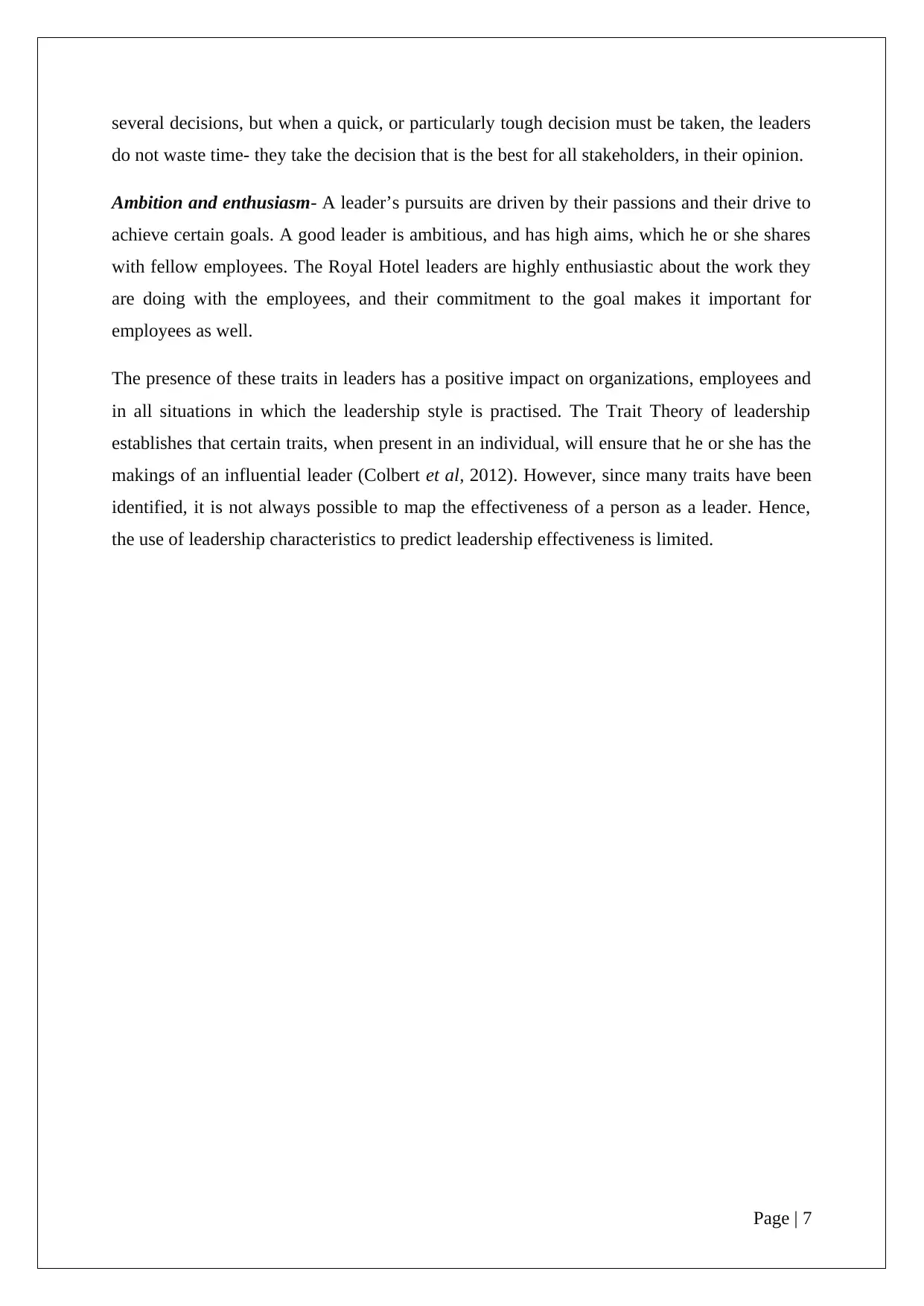
several decisions, but when a quick, or particularly tough decision must be taken, the leaders
do not waste time- they take the decision that is the best for all stakeholders, in their opinion.
Ambition and enthusiasm- A leader’s pursuits are driven by their passions and their drive to
achieve certain goals. A good leader is ambitious, and has high aims, which he or she shares
with fellow employees. The Royal Hotel leaders are highly enthusiastic about the work they
are doing with the employees, and their commitment to the goal makes it important for
employees as well.
The presence of these traits in leaders has a positive impact on organizations, employees and
in all situations in which the leadership style is practised. The Trait Theory of leadership
establishes that certain traits, when present in an individual, will ensure that he or she has the
makings of an influential leader (Colbert et al, 2012). However, since many traits have been
identified, it is not always possible to map the effectiveness of a person as a leader. Hence,
the use of leadership characteristics to predict leadership effectiveness is limited.
Page | 7
do not waste time- they take the decision that is the best for all stakeholders, in their opinion.
Ambition and enthusiasm- A leader’s pursuits are driven by their passions and their drive to
achieve certain goals. A good leader is ambitious, and has high aims, which he or she shares
with fellow employees. The Royal Hotel leaders are highly enthusiastic about the work they
are doing with the employees, and their commitment to the goal makes it important for
employees as well.
The presence of these traits in leaders has a positive impact on organizations, employees and
in all situations in which the leadership style is practised. The Trait Theory of leadership
establishes that certain traits, when present in an individual, will ensure that he or she has the
makings of an influential leader (Colbert et al, 2012). However, since many traits have been
identified, it is not always possible to map the effectiveness of a person as a leader. Hence,
the use of leadership characteristics to predict leadership effectiveness is limited.
Page | 7
Paraphrase This Document
Need a fresh take? Get an instant paraphrase of this document with our AI Paraphraser
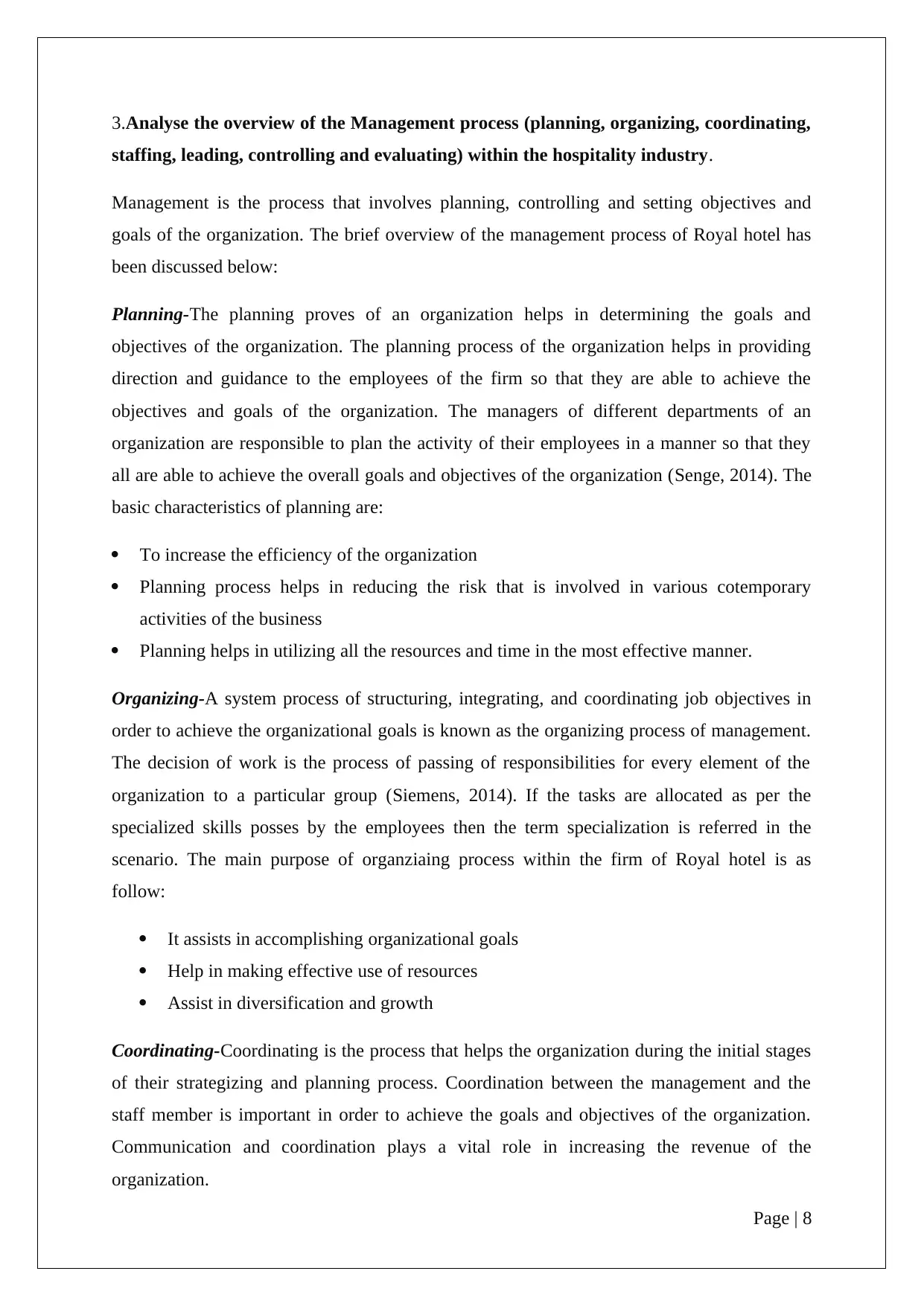
3.Analyse the overview of the Management process (planning, organizing, coordinating,
staffing, leading, controlling and evaluating) within the hospitality industry.
Management is the process that involves planning, controlling and setting objectives and
goals of the organization. The brief overview of the management process of Royal hotel has
been discussed below:
Planning-The planning proves of an organization helps in determining the goals and
objectives of the organization. The planning process of the organization helps in providing
direction and guidance to the employees of the firm so that they are able to achieve the
objectives and goals of the organization. The managers of different departments of an
organization are responsible to plan the activity of their employees in a manner so that they
all are able to achieve the overall goals and objectives of the organization (Senge, 2014). The
basic characteristics of planning are:
To increase the efficiency of the organization
Planning process helps in reducing the risk that is involved in various cotemporary
activities of the business
Planning helps in utilizing all the resources and time in the most effective manner.
Organizing-A system process of structuring, integrating, and coordinating job objectives in
order to achieve the organizational goals is known as the organizing process of management.
The decision of work is the process of passing of responsibilities for every element of the
organization to a particular group (Siemens, 2014). If the tasks are allocated as per the
specialized skills posses by the employees then the term specialization is referred in the
scenario. The main purpose of organziaing process within the firm of Royal hotel is as
follow:
It assists in accomplishing organizational goals
Help in making effective use of resources
Assist in diversification and growth
Coordinating-Coordinating is the process that helps the organization during the initial stages
of their strategizing and planning process. Coordination between the management and the
staff member is important in order to achieve the goals and objectives of the organization.
Communication and coordination plays a vital role in increasing the revenue of the
organization.
Page | 8
staffing, leading, controlling and evaluating) within the hospitality industry.
Management is the process that involves planning, controlling and setting objectives and
goals of the organization. The brief overview of the management process of Royal hotel has
been discussed below:
Planning-The planning proves of an organization helps in determining the goals and
objectives of the organization. The planning process of the organization helps in providing
direction and guidance to the employees of the firm so that they are able to achieve the
objectives and goals of the organization. The managers of different departments of an
organization are responsible to plan the activity of their employees in a manner so that they
all are able to achieve the overall goals and objectives of the organization (Senge, 2014). The
basic characteristics of planning are:
To increase the efficiency of the organization
Planning process helps in reducing the risk that is involved in various cotemporary
activities of the business
Planning helps in utilizing all the resources and time in the most effective manner.
Organizing-A system process of structuring, integrating, and coordinating job objectives in
order to achieve the organizational goals is known as the organizing process of management.
The decision of work is the process of passing of responsibilities for every element of the
organization to a particular group (Siemens, 2014). If the tasks are allocated as per the
specialized skills posses by the employees then the term specialization is referred in the
scenario. The main purpose of organziaing process within the firm of Royal hotel is as
follow:
It assists in accomplishing organizational goals
Help in making effective use of resources
Assist in diversification and growth
Coordinating-Coordinating is the process that helps the organization during the initial stages
of their strategizing and planning process. Coordination between the management and the
staff member is important in order to achieve the goals and objectives of the organization.
Communication and coordination plays a vital role in increasing the revenue of the
organization.
Page | 8
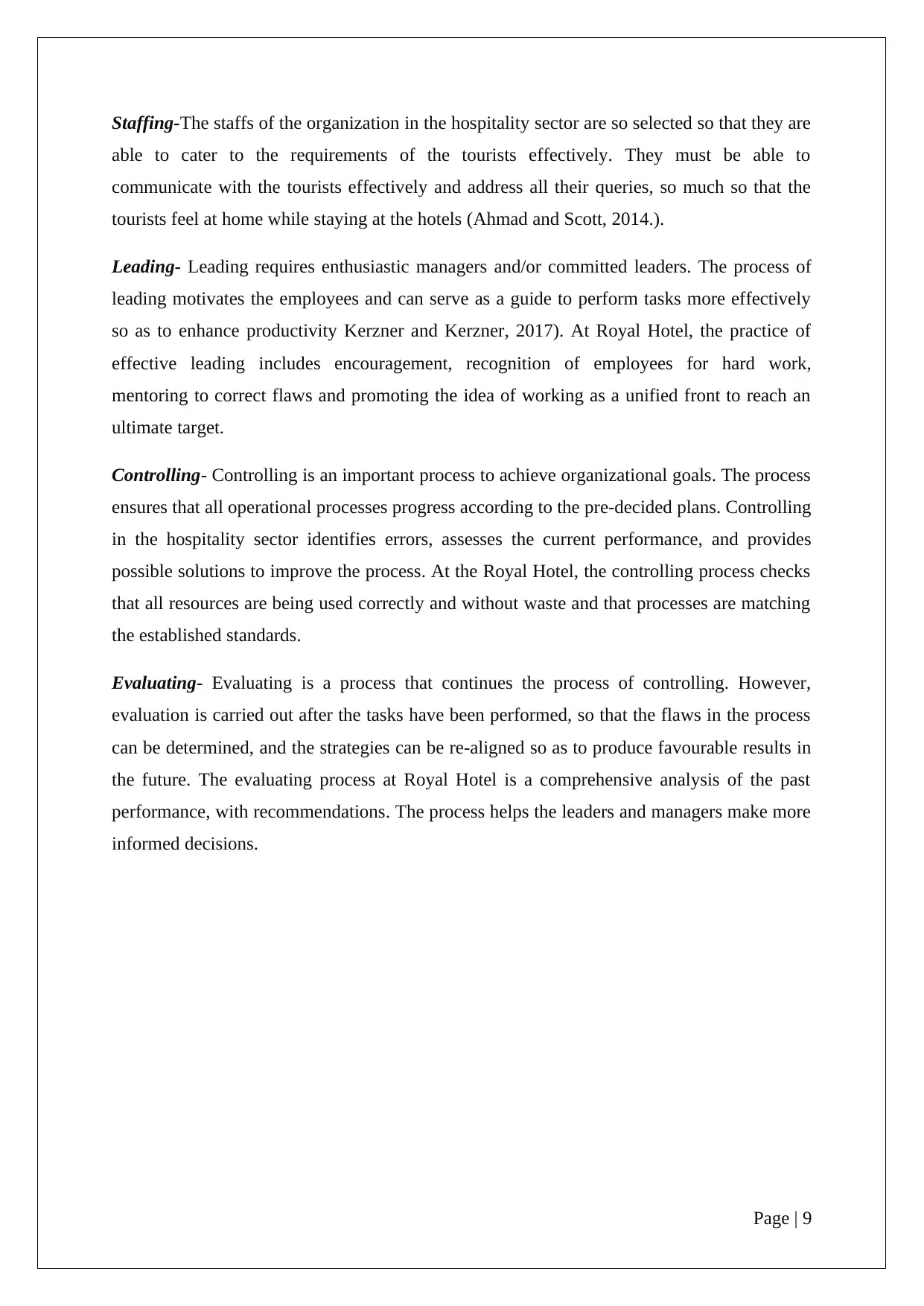
Staffing-The staffs of the organization in the hospitality sector are so selected so that they are
able to cater to the requirements of the tourists effectively. They must be able to
communicate with the tourists effectively and address all their queries, so much so that the
tourists feel at home while staying at the hotels (Ahmad and Scott, 2014.).
Leading- Leading requires enthusiastic managers and/or committed leaders. The process of
leading motivates the employees and can serve as a guide to perform tasks more effectively
so as to enhance productivity Kerzner and Kerzner, 2017). At Royal Hotel, the practice of
effective leading includes encouragement, recognition of employees for hard work,
mentoring to correct flaws and promoting the idea of working as a unified front to reach an
ultimate target.
Controlling- Controlling is an important process to achieve organizational goals. The process
ensures that all operational processes progress according to the pre-decided plans. Controlling
in the hospitality sector identifies errors, assesses the current performance, and provides
possible solutions to improve the process. At the Royal Hotel, the controlling process checks
that all resources are being used correctly and without waste and that processes are matching
the established standards.
Evaluating- Evaluating is a process that continues the process of controlling. However,
evaluation is carried out after the tasks have been performed, so that the flaws in the process
can be determined, and the strategies can be re-aligned so as to produce favourable results in
the future. The evaluating process at Royal Hotel is a comprehensive analysis of the past
performance, with recommendations. The process helps the leaders and managers make more
informed decisions.
Page | 9
able to cater to the requirements of the tourists effectively. They must be able to
communicate with the tourists effectively and address all their queries, so much so that the
tourists feel at home while staying at the hotels (Ahmad and Scott, 2014.).
Leading- Leading requires enthusiastic managers and/or committed leaders. The process of
leading motivates the employees and can serve as a guide to perform tasks more effectively
so as to enhance productivity Kerzner and Kerzner, 2017). At Royal Hotel, the practice of
effective leading includes encouragement, recognition of employees for hard work,
mentoring to correct flaws and promoting the idea of working as a unified front to reach an
ultimate target.
Controlling- Controlling is an important process to achieve organizational goals. The process
ensures that all operational processes progress according to the pre-decided plans. Controlling
in the hospitality sector identifies errors, assesses the current performance, and provides
possible solutions to improve the process. At the Royal Hotel, the controlling process checks
that all resources are being used correctly and without waste and that processes are matching
the established standards.
Evaluating- Evaluating is a process that continues the process of controlling. However,
evaluation is carried out after the tasks have been performed, so that the flaws in the process
can be determined, and the strategies can be re-aligned so as to produce favourable results in
the future. The evaluating process at Royal Hotel is a comprehensive analysis of the past
performance, with recommendations. The process helps the leaders and managers make more
informed decisions.
Page | 9
⊘ This is a preview!⊘
Do you want full access?
Subscribe today to unlock all pages.

Trusted by 1+ million students worldwide
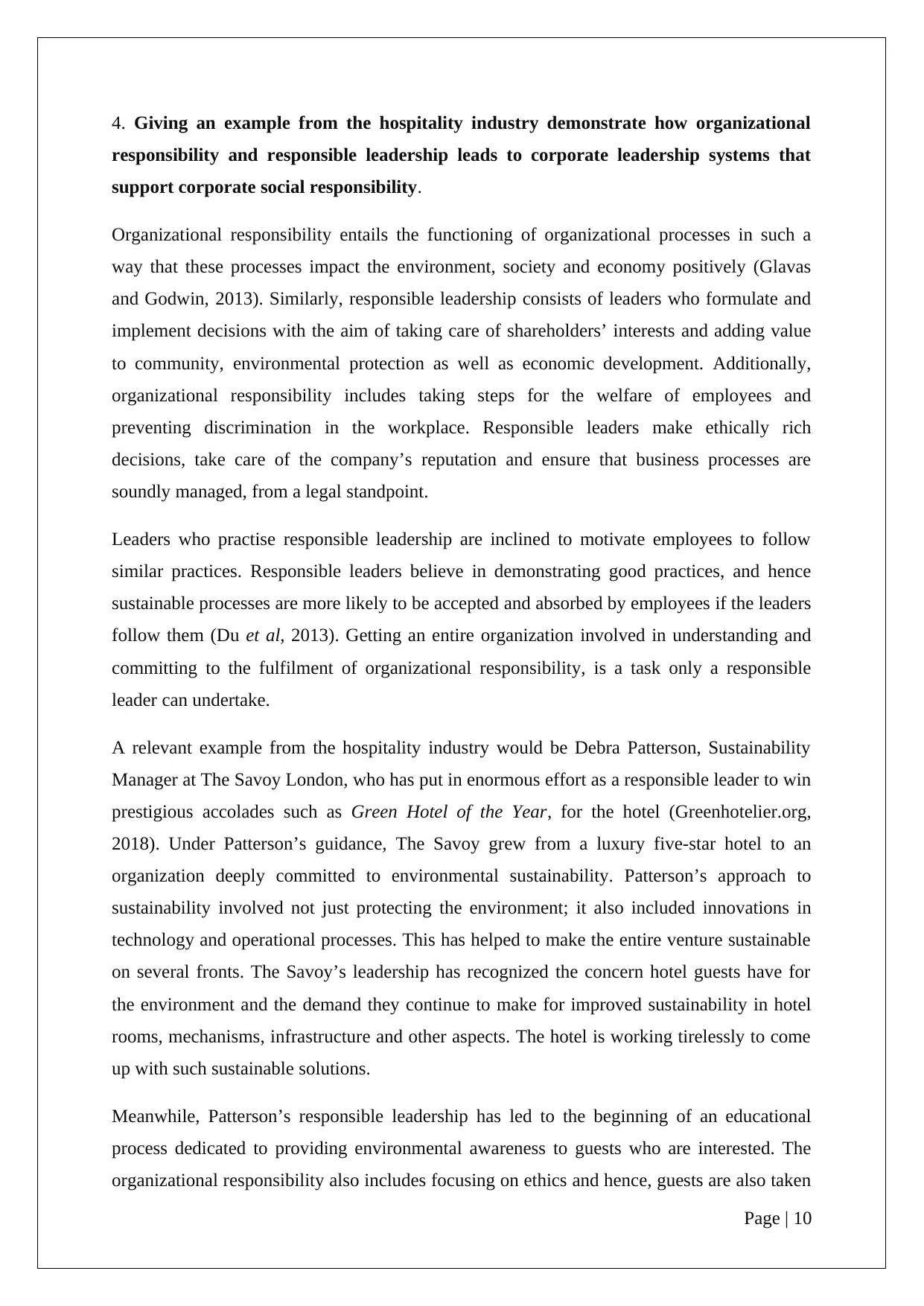
4. Giving an example from the hospitality industry demonstrate how organizational
responsibility and responsible leadership leads to corporate leadership systems that
support corporate social responsibility.
Organizational responsibility entails the functioning of organizational processes in such a
way that these processes impact the environment, society and economy positively (Glavas
and Godwin, 2013). Similarly, responsible leadership consists of leaders who formulate and
implement decisions with the aim of taking care of shareholders’ interests and adding value
to community, environmental protection as well as economic development. Additionally,
organizational responsibility includes taking steps for the welfare of employees and
preventing discrimination in the workplace. Responsible leaders make ethically rich
decisions, take care of the company’s reputation and ensure that business processes are
soundly managed, from a legal standpoint.
Leaders who practise responsible leadership are inclined to motivate employees to follow
similar practices. Responsible leaders believe in demonstrating good practices, and hence
sustainable processes are more likely to be accepted and absorbed by employees if the leaders
follow them (Du et al, 2013). Getting an entire organization involved in understanding and
committing to the fulfilment of organizational responsibility, is a task only a responsible
leader can undertake.
A relevant example from the hospitality industry would be Debra Patterson, Sustainability
Manager at The Savoy London, who has put in enormous effort as a responsible leader to win
prestigious accolades such as Green Hotel of the Year, for the hotel (Greenhotelier.org,
2018). Under Patterson’s guidance, The Savoy grew from a luxury five-star hotel to an
organization deeply committed to environmental sustainability. Patterson’s approach to
sustainability involved not just protecting the environment; it also included innovations in
technology and operational processes. This has helped to make the entire venture sustainable
on several fronts. The Savoy’s leadership has recognized the concern hotel guests have for
the environment and the demand they continue to make for improved sustainability in hotel
rooms, mechanisms, infrastructure and other aspects. The hotel is working tirelessly to come
up with such sustainable solutions.
Meanwhile, Patterson’s responsible leadership has led to the beginning of an educational
process dedicated to providing environmental awareness to guests who are interested. The
organizational responsibility also includes focusing on ethics and hence, guests are also taken
Page | 10
responsibility and responsible leadership leads to corporate leadership systems that
support corporate social responsibility.
Organizational responsibility entails the functioning of organizational processes in such a
way that these processes impact the environment, society and economy positively (Glavas
and Godwin, 2013). Similarly, responsible leadership consists of leaders who formulate and
implement decisions with the aim of taking care of shareholders’ interests and adding value
to community, environmental protection as well as economic development. Additionally,
organizational responsibility includes taking steps for the welfare of employees and
preventing discrimination in the workplace. Responsible leaders make ethically rich
decisions, take care of the company’s reputation and ensure that business processes are
soundly managed, from a legal standpoint.
Leaders who practise responsible leadership are inclined to motivate employees to follow
similar practices. Responsible leaders believe in demonstrating good practices, and hence
sustainable processes are more likely to be accepted and absorbed by employees if the leaders
follow them (Du et al, 2013). Getting an entire organization involved in understanding and
committing to the fulfilment of organizational responsibility, is a task only a responsible
leader can undertake.
A relevant example from the hospitality industry would be Debra Patterson, Sustainability
Manager at The Savoy London, who has put in enormous effort as a responsible leader to win
prestigious accolades such as Green Hotel of the Year, for the hotel (Greenhotelier.org,
2018). Under Patterson’s guidance, The Savoy grew from a luxury five-star hotel to an
organization deeply committed to environmental sustainability. Patterson’s approach to
sustainability involved not just protecting the environment; it also included innovations in
technology and operational processes. This has helped to make the entire venture sustainable
on several fronts. The Savoy’s leadership has recognized the concern hotel guests have for
the environment and the demand they continue to make for improved sustainability in hotel
rooms, mechanisms, infrastructure and other aspects. The hotel is working tirelessly to come
up with such sustainable solutions.
Meanwhile, Patterson’s responsible leadership has led to the beginning of an educational
process dedicated to providing environmental awareness to guests who are interested. The
organizational responsibility also includes focusing on ethics and hence, guests are also taken
Page | 10
Paraphrase This Document
Need a fresh take? Get an instant paraphrase of this document with our AI Paraphraser
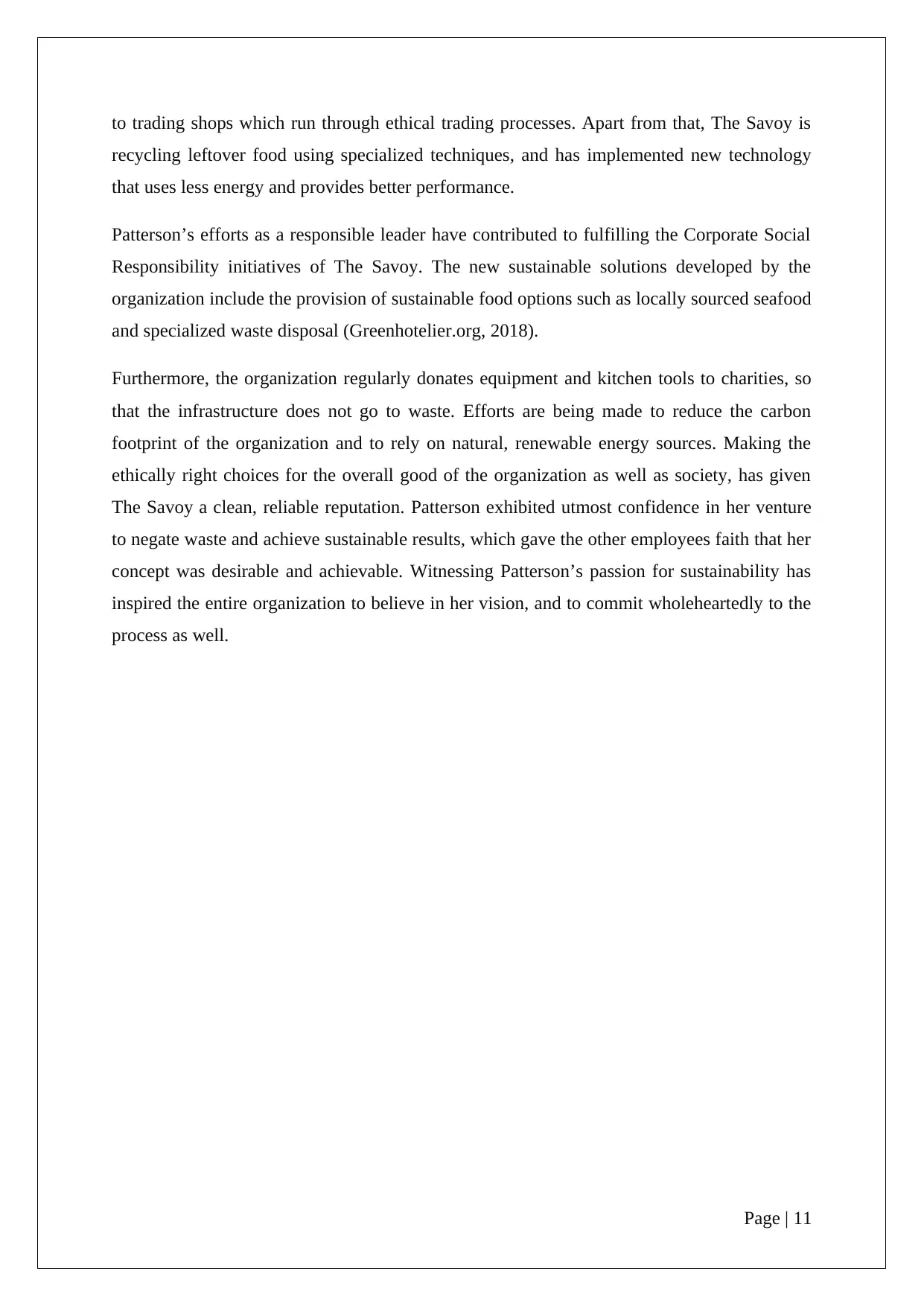
to trading shops which run through ethical trading processes. Apart from that, The Savoy is
recycling leftover food using specialized techniques, and has implemented new technology
that uses less energy and provides better performance.
Patterson’s efforts as a responsible leader have contributed to fulfilling the Corporate Social
Responsibility initiatives of The Savoy. The new sustainable solutions developed by the
organization include the provision of sustainable food options such as locally sourced seafood
and specialized waste disposal (Greenhotelier.org, 2018).
Furthermore, the organization regularly donates equipment and kitchen tools to charities, so
that the infrastructure does not go to waste. Efforts are being made to reduce the carbon
footprint of the organization and to rely on natural, renewable energy sources. Making the
ethically right choices for the overall good of the organization as well as society, has given
The Savoy a clean, reliable reputation. Patterson exhibited utmost confidence in her venture
to negate waste and achieve sustainable results, which gave the other employees faith that her
concept was desirable and achievable. Witnessing Patterson’s passion for sustainability has
inspired the entire organization to believe in her vision, and to commit wholeheartedly to the
process as well.
Page | 11
recycling leftover food using specialized techniques, and has implemented new technology
that uses less energy and provides better performance.
Patterson’s efforts as a responsible leader have contributed to fulfilling the Corporate Social
Responsibility initiatives of The Savoy. The new sustainable solutions developed by the
organization include the provision of sustainable food options such as locally sourced seafood
and specialized waste disposal (Greenhotelier.org, 2018).
Furthermore, the organization regularly donates equipment and kitchen tools to charities, so
that the infrastructure does not go to waste. Efforts are being made to reduce the carbon
footprint of the organization and to rely on natural, renewable energy sources. Making the
ethically right choices for the overall good of the organization as well as society, has given
The Savoy a clean, reliable reputation. Patterson exhibited utmost confidence in her venture
to negate waste and achieve sustainable results, which gave the other employees faith that her
concept was desirable and achievable. Witnessing Patterson’s passion for sustainability has
inspired the entire organization to believe in her vision, and to commit wholeheartedly to the
process as well.
Page | 11

Summary and Conclusion
This assignment studied the applicability of different leadership styles, using examples from
the hospitality industry. The important leadership traits were examined with respect to the
hospitality industry, and the use of these traits by leadership at the Royal Hotel was analysed.
The Trait Theory of Leadership was mentioned, and it was concluded that leadership traits
cannot always predict leadership effectiveness. The assignment explored the significance of
the management process, and its components such as planning, organizing, coordinating,
staffing, leading, controlling and evaluating in the hospitality sector. The management
process was understood in context of the Royal Hotel as well. Finally, the example of Debra
Patterson, Sustainability Manager at The Savoy London, was considered to examine how
organizational responsibility and responsible leadership can contribute to Corporate Social
Responsibility. It was observed that responsible leadership is an effective motivator and
catalyst for employees to fulfil the organization’s CSR objectives.
Page | 12
This assignment studied the applicability of different leadership styles, using examples from
the hospitality industry. The important leadership traits were examined with respect to the
hospitality industry, and the use of these traits by leadership at the Royal Hotel was analysed.
The Trait Theory of Leadership was mentioned, and it was concluded that leadership traits
cannot always predict leadership effectiveness. The assignment explored the significance of
the management process, and its components such as planning, organizing, coordinating,
staffing, leading, controlling and evaluating in the hospitality sector. The management
process was understood in context of the Royal Hotel as well. Finally, the example of Debra
Patterson, Sustainability Manager at The Savoy London, was considered to examine how
organizational responsibility and responsible leadership can contribute to Corporate Social
Responsibility. It was observed that responsible leadership is an effective motivator and
catalyst for employees to fulfil the organization’s CSR objectives.
Page | 12
⊘ This is a preview!⊘
Do you want full access?
Subscribe today to unlock all pages.

Trusted by 1+ million students worldwide
1 out of 14
Related Documents
Your All-in-One AI-Powered Toolkit for Academic Success.
+13062052269
info@desklib.com
Available 24*7 on WhatsApp / Email
![[object Object]](/_next/static/media/star-bottom.7253800d.svg)
Unlock your academic potential
Copyright © 2020–2026 A2Z Services. All Rights Reserved. Developed and managed by ZUCOL.




